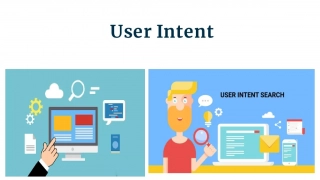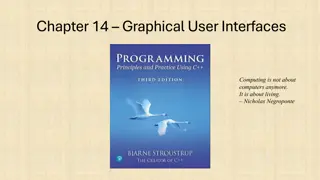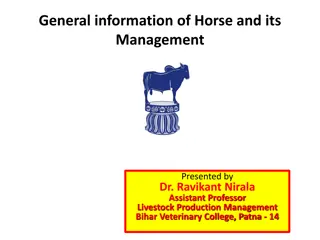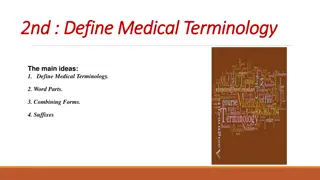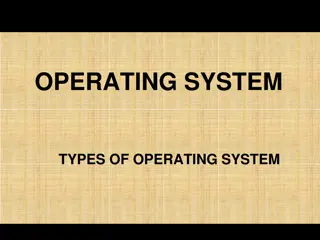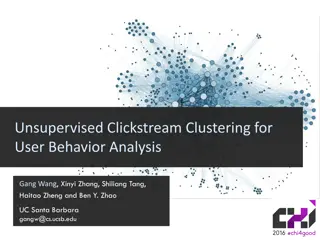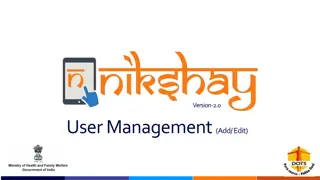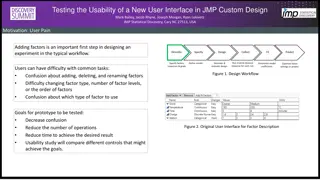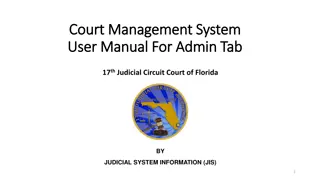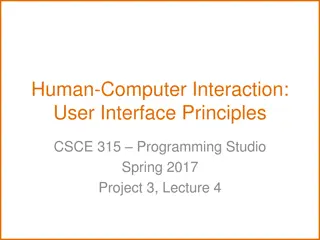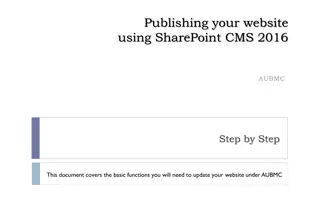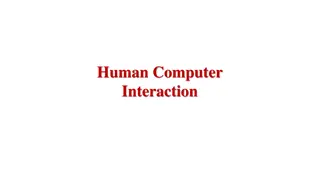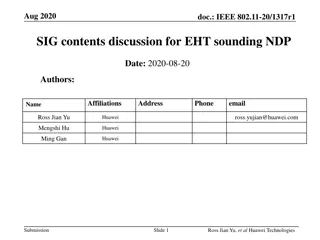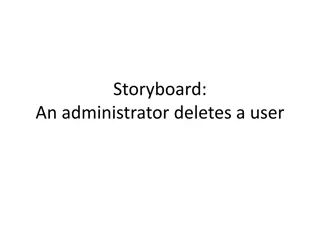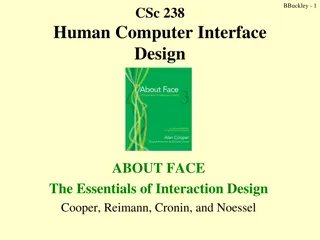Medical Terminology - 2nd Stage
Dr. Talib Chichan presents medical terminology related to the gastrointestinal system. Learn about the anatomy, terminology, and common conditions.
2 views • 18 slides
Maximizing Impact: The Role of Rich Snippets in SERPs"User Intent
User intent, also known as search intent, refers to the underlying goal or purpose a user has when performing an online search. It goes beyond the literal interpretation of keywords and focuses on understanding why a person is searching. Recognizing and catering to user intent is crucial for creatin
3 views • 10 slides
Understanding Medical Terminology: Suffixes and Their Importance in Healthcare
Explore the significance of suffixes in medical terminology, how they modify word meanings, and the importance of dissecting terms to understand their components. Learn how suffixes denote conditions, aid in pronunciation, and convey crucial information in healthcare terminology.
4 views • 65 slides
Understanding Prism Terminology and Light Deviation
Prisms are optical devices that deviate light without changing its vergence. This module explores the various terminology associated with prisms, including Apex, Base, Refracting Angle, and Angle of Deviation. The passage of light through a prism follows Snell's Law, where the ray is deviated toward
4 views • 42 slides
Operating Systems
An operating system is a crucial program that manages all other programs on a computer. It handles tasks like input recognition, file management, and device control. There are different types of operating systems such as single-user, single-task systems, multi-user, multi-task systems, real-time ope
6 views • 11 slides
Medical Terminology Health Science 20
Medical terminology is a specialized language used in healthcare to describe medical concepts concisely. It consists of prefixes, root words, and suffixes, which can be broken down to define complex terms. Utilizing proper medical terminology enhances communication among healthcare professionals and
3 views • 16 slides
The Evolution of Graphical User Interfaces in Computing
Graphical User Interfaces (GUIs) have transformed computing into a more user-friendly and interactive experience, emphasizing the shift from technology-focused to human-centric living. This chapter delves into the various aspects of GUIs, including I/O alternatives, common GUI tasks, programming per
1 views • 32 slides
Understanding Linux User Capabilities and Namespace Management
Linux user namespaces and capabilities play a critical role in managing system security and permissions. Users and groups are assigned unique IDs, and processes are associated with the user's ID. The kernel enforces permission checks based on user IDs and group IDs, allowing root access to bypass ce
0 views • 14 slides
Horse Management and Common Terminology Overview
Dr. Ravikant Nirala, Assistant Professor at Bihar Veterinary College, presents comprehensive information on horse management and common terminology associated with equine production. The content covers the position of horses in the animal kingdom, terminology for different horse genders and ages, mi
1 views • 15 slides
Basics of Medical Terminology in Health Care Oncology
This module provides training on medical terminology basics for patient navigators in oncology. It covers defining terms using prefixes, root words, and suffixes, common oncology words, and available resources. Learn how to approach medical terminology effectively by understanding word roots and com
1 views • 20 slides
Understanding Medical Terminology: Key Components and Usage
Medical terminology is a specialized language used by healthcare professionals worldwide, rooted in Greek and Latin words. It comprises word parts, such as roots, prefixes, and suffixes, which are crucial for forming and understanding medical terms. The combining forms aid in pronunciation and help
2 views • 17 slides
Understanding Heuristic Evaluation in User Interface Design
Heuristic evaluation is an analytical method where experts evaluate interfaces based on usability principles. This evaluation helps in identifying potential design issues that may impact user satisfaction. The process involves a small group of evaluators reviewing the interface against a set of reco
5 views • 12 slides
Understanding ICD-11 and ICHI: Terminology, Overview, and Purpose
International Classification of Diseases (ICD-11) and International Classification of Health Interventions (ICHI) provide a comprehensive framework for recording and analyzing health data globally. The system ensures semantic interoperability, integrates terminology and classification, and supports
4 views • 21 slides
Understanding Different Types of Operating Systems
An operating system is the crucial program that manages a computer's resources and acts as an interface between the user and the machine. Various types of operating systems exist, including real-time, multi-user vs. single-user, multi-tasking vs. single-tasking, distributed, and embedded systems. Re
1 views • 11 slides
Implementing Alert Messages and User Input Handling in Java
This tutorial guides you through creating alert messages, handling user input, defining functions, calling functions from the `onCreate` method, and creating an XML file for user data entry validation in Java. Learn how to display alerts for empty user credentials and process user actions accordingl
1 views • 6 slides
Understanding Quarantine Structure and Terminology
Explore the structure and terminology of quarantine, including its purpose, restrictions, and terminology for zones and premises. Learn about the different types of quarantine premises, such as infected, contact, suspect, and at-risk premises, and understand the necessary biosecurity measures. Gain
0 views • 23 slides
Unsupervised Clickstream Clustering for User Behavior Analysis
Understanding user behavior in online services is crucial for businesses. This research focuses on utilizing clickstream data to identify natural clusters of user behavior and extract meaningful insights at scale. By analyzing detailed user logs, the study aims to reveal hidden patterns in user inte
0 views • 19 slides
Domain-Specific Visual Analytics Systems: Exploring Expert User Insights
This presentation delves into domain-specific visual analytics systems focusing on political simulation, wire fraud detection, bridge maintenance, and more. It emphasizes leveraging user expertise for effective system design and evaluation, highlighting the importance of user insights in data analys
0 views • 27 slides
Efficient User Management System for Health Facilities
Record and manage user details effectively with the new Version 2.0 User Management feature. RNTCP has now registered over 35,000 PHIs, 140,000 Private Health Facilities, 15,000 Private Labs, 31,000 Private Chemists, across 700 Districts and 8,000 TUs in Nikshay. Enhance operations by editing TU pro
0 views • 26 slides
User Roles and Responsibilities Overview
The user roles within the application are categorized into Account Manager, Data Steward, and Common Functionality roles. Each role comes with specific responsibilities such as managing user accounts, database management, data stewardship, incident management, and more. Non-privileged roles provide
0 views • 11 slides
Understanding Agile User Stories in Software Development
Agile user stories play a crucial role in software development by providing short descriptions of features desired by customers in a language they understand. This method allows for agile planning, efficient documentation, and effective communication between development teams and clients. Extracting
0 views • 30 slides
Exploring Usability Testing of New Interface in JMP Custom Design
In this study by Mark Bailey et al. from JMP Statistical Discovery in the USA, the focus lies on testing the usability of a new user interface using JMP Custom Design. The researchers highlight the significance of adding factors in the initial experiment design workflow to enhance user experience. U
0 views • 8 slides
Salesforce User Guide: Logging In, Navigation, and Contacts Overview
Learn about logging into Salesforce, navigating the platform, managing contacts and organizations, as well as helpful tips and terminology. Find guidance on setting up your account, troubleshooting login issues, and understanding Salesforce terminology such as Contacts, Users, and more.
0 views • 23 slides
Guide to Court Management System User Administration
Learn how to effectively manage user profiles, create sub-user accounts for legal assistants, update user information, and create associates' accounts in the Court Management System for the 17th Judicial Circuit Court of Florida. Detailed instructions provided for changing usernames, passwords, and
0 views • 15 slides
Enhancing User Experience Through Data Trails and Metrics
Andrea Thompson, a Sr. User Experience Manager at The Home Depot, highlights the importance of measuring and analyzing user experience metrics to understand and improve customer interactions. By investigating data trails from various touchpoints, such as customer sign-ups, interactions with associat
0 views • 17 slides
Understanding UNIX System Permissions and User Terminology
Explore the concept of UNIX system permissions, including discretionary access control (DAC) model, user terminology, file/directory access, access permission modes, categories of users, and checking permissions using examples. Learn about user IDs, groups, superuser privileges, ownership, access mo
0 views • 24 slides
Understanding User Identity and Access Tokens in Windows Security
Delve into the intricate world of user identity and access tokens in Windows security. Explore how user identities are represented, the structure of access tokens, and the significance of processes running under different user contexts. Gain insights into advanced Windows security principles and lea
1 views • 13 slides
User Interface Design Principles in Human-Computer Interaction
User interface design principles are crucial in Human-Computer Interaction. This content highlights key principles such as aesthetics, anticipation, autonomy, and color consideration for users with color blindness. It emphasizes the importance of user testing, user autonomy, and providing essential
0 views • 24 slides
AUBMC SharePoint CMS 2016 User Manual
This comprehensive user manual covers step-by-step instructions for updating and managing a website using SharePoint CMS 2016 at the American University of Beirut Medical Center (AUBMC). It includes sections on SharePoint terminology, user roles/permissions, navigation, document management, site man
0 views • 22 slides
Understanding Interaction Design in Human-Computer Interaction
Interaction design focuses on creating interactive products that are easy, effective, and enjoyable to use. It aims to reduce negative user experiences while enhancing positive ones. Designing interactive products requires understanding user activities, interfaces, and device arrangements to support
0 views • 11 slides
Basic Medical Terminology Tutorial and Exam Guidelines
Explore the basics of medical terminology, study materials, testing procedures, and course objectives. Understand the importance of Latin and Greek terminology in medicine, testing protocols, credit test information, attendance requirements, and course outcomes. Enhance your knowledge and skills in
0 views • 41 slides
IEEE 802.11-20/1317r1 EHT-SIG Proposal Discussion
The document discusses EHT-SIG for single-user and sounding NDP in IEEE 802.11-20/1317r1, focusing on overflow bits, user fields, CRC, and tail formats. It covers the format details, subfields, and overhead compared to HE sounding, proposing specific bit allocations for different elements. The EHT-S
0 views • 16 slides
Administrator Deletes User - User Management System Storyboard
An administrator navigates through a user list, selects a user for deletion, confirms the action, and successfully removes the user from the system. The process involves interacting with user details, confirming the deletion, and updating the user list accordingly in a structured manner.
0 views • 4 slides
User Interface vs User Experience: Understanding the Essentials
Exploring the distinctions between User Interface (UI) and User Experience (UX) in human-computer interaction design. UI focuses on the space of interaction between humans and machines, while UX encompasses users' behavior, attitude, and emotions towards a product or service. The goal is to create i
0 views • 63 slides
Medical Terminology III: Word Formation, Definitions, and Matching
Explore and practice medical terminology with exercises on word formation, correcting mistakes, translating, explaining derived words, matching terms, forming compound words, and identifying types of paralysis. Enhance your knowledge of Greek elements in medical terminology and test your understandi
0 views • 14 slides
Comprehensive Guide to Medical Terminology Course and Word Elements
Study medical terminology with the Medical Terminology Course by Dr. Ghassan Adnan Hasan to enhance your understanding of basic medical terms, word roots, and suffixes. Learn about word elements like roots, prefixes, and suffixes, and explore examples to grasp the essentials of medical terminology e
0 views • 41 slides
Introduction to Medical Terminology Course Overview
Medical terminology is a specialized language crucial for effective communication in healthcare. This course aims to equip students with essential knowledge on word structure, body organization, diagnostic terminology, and medical abbreviations. Upon completion, students will be able to analyze and
0 views • 9 slides
Understanding Context Switching and User-Kernel Interaction in Operating Systems
Context switching in operating systems involves a seamless transition between user-level threads without the kernel's awareness. User-level code manages register state and stack pointers, while user-kernel mode switching requires changing processor privilege levels and agreement on information excha
0 views • 25 slides
Anatomical Terminology Practice Exam: Body Regions and Landmarks
Test your knowledge of anatomical terminology by identifying various body regions and landmarks in this interactive practice exam. Practice naming cranial, cervical, thoracic, pubic, pectoral, axillary, brachial, and antecubital regions with the help of visual aids. Improve your understanding of ana
0 views • 32 slides
Veterinary Medical Terminology: Introduction to Body Planes and Common Terms
Explore the fundamental aspects of veterinary medical terminology, focusing on body planes, common terms for body parts, and root words. Learn about directional terms and how to use them appropriately in a veterinary context. Images and information from "Veterinary Medical Terminology, 2nd edition b
0 views • 20 slides

